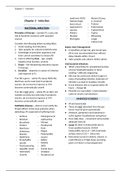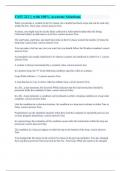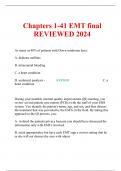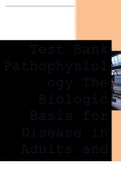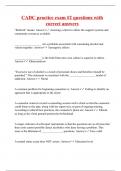Chapter 5 – Infection
syndrome (HUS) disease (Group
Chapter 5 - Infection - Haemorrhagic A, invasive)
fever (virus) - Tetanus
BACTERIAL INFECTION - Legionnaire’s - Tuberculosis
- Leprosy - Typhoid fever
Principles of therapy - consider Pt, cause and - Malaria - Typhus
risk of bacterial resistance with repeated - Measles - Whooping
courses - Meningitis cough
- Yellow fever
Consider the following before starting AB(s):
1. Avoid treating viral infections Sepsis: Early Management
2. Take samples for culture/sensitivity tests If identified as high risk, give broad-spec
3. Knowledge of prevalent organisms and AB at max recommended dose without
their current sensitivity to choose AB delay (ideally within 1 hour)
4. Factors affecting dose – age, weight, Take samples and cultures before admin
hepatic/renal function, severity
5. Route – life-threatening infections require Oral bacterial infections
IV therapy ‘Blind’ prescribing for unexplained pyrexia,
6. Duration – depends on nature of infection cervical lymphadenopathy or facial
and response to Tx swelling = difficulty diagnosing
ABs may be useful post dental surgery in
If an AB is given – advise Pts about ADRs like cases of spreading infection. Extension of
diarrhoea and to seek help if symptoms infection can lead to maxillary sinusitis
worsen, do not start to improve or if Pt If oral infection fails to respond within 48
becomes systematically unwell hours – change AB
If an AB is NOT given – advise Pts an AB is not Penicillin (or macrolide) + metronidazole –
needed currently but seek help if symptoms useful in severe oral infections
worsen, do not start to improve or if Pt AMINOGLYCOSIDES
becomes systematically unwell
All are bactericidal
Notifiable diseases – doctors must notify the These are NOT absorbed from the gut
Proper Officer of the local authority when hence must be given parenterally
attending a Pt suspected of suffering from: Amikacin, gentamicin and tobramycin –
- Anthrax - Meningococcal active against Pseudomonas aeruginosa
- Botulism septicaemia Once daily dose – convenient and provides
- Brucellosis - Mumps adequate [serum]
- Cholera - Parathyroid Avoid OD dose in endocarditis due to
- Diarrhoea fever Gram-positive bacteria, HACEK
(infectious, - Plague endocarditis, burns of > 20% total body
bloody) - Poliomyelitis surface area or CrCl < 20mL/min
- Diphtheria (acute) Determine [serum] in elderly, obesity, in
- Encephalitis - Rabies cystic fibrosis or if high doses are being
(acute) - Rubella given or if there’s renal impairment
- Food poisoning - SARS
- Hepatitis (viral) - Scarlet fever
- Haemolytic - Smallpox
uraemic - Streptococcal
, Chapter 5 – Infection
Gentamicin – loading/maintenance doses are OD dose) – greater activity than 2nd gen but
calculated based on weight and renal function less active against Staphylococcus aureus
then adjusted according to the [serum]. High
5th gen = Ceftaroline – has extended spectrum
doses are indicated for serious infections esp.
of activity against MRSA and multi-drug
in neonates, cystic fibrosis or
resistant Streptococcus pneumoniae
immunocompromised. Avoid treating for
longer than 7 days MACROLIDES
Neomycin – too toxic for parenteral use and Indications = RTIs, campylobacter enteritis
only used for skin infections, mucous and skin infections
membrane infections or to reduce bacterial Erythromycin – poor activity against H.
population of colon before bowel surgery influenzae and causes N/V
Azithromycin – less activity against G+ve
CARBAPENEMS
bacteria compared to erythromycin but
These are beta-lactams with a broad- enhanced activity against H. influenzae
spectrum of activity Clarithromycin – erythromycin derivative
Imipenem and meropenem – good activity with greater activity than parent comp.
against Pseudomonas aeruginosa
As imipenem is partially inactivated in the PENICILLINS
kidneys, it’s given with cilastatin (specific Benzylpenicillin, Phenoxymethylpenicillin
enzyme inhibitor) BP (Penicillin G) = inactivated by bacterial
Meropenem and ertapenem are stable to beta-lactamases and by gastric acid and
the enzyme hence they’re given alone absorption from GI tract is low hence must
be given parenterally
CEPHALOSPORINS
PMP (Penicillin V) = gastric-acid stable so
Penetrate the cerebrospinal fluid poorly suitable orally. Avoid in severe infections
unless the meninges are inflamed as absorption can be unpredictable and
0.5-6.5% of penicillin-sensitive Pts are also [plasma] vary.
allergic to cephs Benzathine benzylpenicillin – via IM
Avoid the following if H/O immediate
Penicillinase-Resistant Penicillins
hypersensitivity – cefaclor, cefadroxil,
Most staphylococci are resistant to BP as
cefalexin, cefradine, Ceftaroline
they produce penicillinases
1st and 2nd gen are useful for UTIs esp. in
Flucloxacillin – stable against enzymes,
pregnancy, RTIs, otitis media and skin and
acid-stable, well absorbed from gut = can
soft-tissues
be given orally or parenterally
Calcium salt of ceftriaxone forms
Temocillin – reserved for infections caused
precipitate in gall bladder. This usually
by beta-lactamase producing strains of G-
resolves upon cessation
ve bacteria
1st gen = cefalexin, cefradine, cefadroxil
2nd gen = cefaclor (good activity against H.
influenzae), cefuroxime (poorly absorbed
hence give with food)
3rd gen = cefixime (longer DoA), cefotaxime,
ceftazidime, ceftriaxone (long half-life hence
syndrome (HUS) disease (Group
Chapter 5 - Infection - Haemorrhagic A, invasive)
fever (virus) - Tetanus
BACTERIAL INFECTION - Legionnaire’s - Tuberculosis
- Leprosy - Typhoid fever
Principles of therapy - consider Pt, cause and - Malaria - Typhus
risk of bacterial resistance with repeated - Measles - Whooping
courses - Meningitis cough
- Yellow fever
Consider the following before starting AB(s):
1. Avoid treating viral infections Sepsis: Early Management
2. Take samples for culture/sensitivity tests If identified as high risk, give broad-spec
3. Knowledge of prevalent organisms and AB at max recommended dose without
their current sensitivity to choose AB delay (ideally within 1 hour)
4. Factors affecting dose – age, weight, Take samples and cultures before admin
hepatic/renal function, severity
5. Route – life-threatening infections require Oral bacterial infections
IV therapy ‘Blind’ prescribing for unexplained pyrexia,
6. Duration – depends on nature of infection cervical lymphadenopathy or facial
and response to Tx swelling = difficulty diagnosing
ABs may be useful post dental surgery in
If an AB is given – advise Pts about ADRs like cases of spreading infection. Extension of
diarrhoea and to seek help if symptoms infection can lead to maxillary sinusitis
worsen, do not start to improve or if Pt If oral infection fails to respond within 48
becomes systematically unwell hours – change AB
If an AB is NOT given – advise Pts an AB is not Penicillin (or macrolide) + metronidazole –
needed currently but seek help if symptoms useful in severe oral infections
worsen, do not start to improve or if Pt AMINOGLYCOSIDES
becomes systematically unwell
All are bactericidal
Notifiable diseases – doctors must notify the These are NOT absorbed from the gut
Proper Officer of the local authority when hence must be given parenterally
attending a Pt suspected of suffering from: Amikacin, gentamicin and tobramycin –
- Anthrax - Meningococcal active against Pseudomonas aeruginosa
- Botulism septicaemia Once daily dose – convenient and provides
- Brucellosis - Mumps adequate [serum]
- Cholera - Parathyroid Avoid OD dose in endocarditis due to
- Diarrhoea fever Gram-positive bacteria, HACEK
(infectious, - Plague endocarditis, burns of > 20% total body
bloody) - Poliomyelitis surface area or CrCl < 20mL/min
- Diphtheria (acute) Determine [serum] in elderly, obesity, in
- Encephalitis - Rabies cystic fibrosis or if high doses are being
(acute) - Rubella given or if there’s renal impairment
- Food poisoning - SARS
- Hepatitis (viral) - Scarlet fever
- Haemolytic - Smallpox
uraemic - Streptococcal
, Chapter 5 – Infection
Gentamicin – loading/maintenance doses are OD dose) – greater activity than 2nd gen but
calculated based on weight and renal function less active against Staphylococcus aureus
then adjusted according to the [serum]. High
5th gen = Ceftaroline – has extended spectrum
doses are indicated for serious infections esp.
of activity against MRSA and multi-drug
in neonates, cystic fibrosis or
resistant Streptococcus pneumoniae
immunocompromised. Avoid treating for
longer than 7 days MACROLIDES
Neomycin – too toxic for parenteral use and Indications = RTIs, campylobacter enteritis
only used for skin infections, mucous and skin infections
membrane infections or to reduce bacterial Erythromycin – poor activity against H.
population of colon before bowel surgery influenzae and causes N/V
Azithromycin – less activity against G+ve
CARBAPENEMS
bacteria compared to erythromycin but
These are beta-lactams with a broad- enhanced activity against H. influenzae
spectrum of activity Clarithromycin – erythromycin derivative
Imipenem and meropenem – good activity with greater activity than parent comp.
against Pseudomonas aeruginosa
As imipenem is partially inactivated in the PENICILLINS
kidneys, it’s given with cilastatin (specific Benzylpenicillin, Phenoxymethylpenicillin
enzyme inhibitor) BP (Penicillin G) = inactivated by bacterial
Meropenem and ertapenem are stable to beta-lactamases and by gastric acid and
the enzyme hence they’re given alone absorption from GI tract is low hence must
be given parenterally
CEPHALOSPORINS
PMP (Penicillin V) = gastric-acid stable so
Penetrate the cerebrospinal fluid poorly suitable orally. Avoid in severe infections
unless the meninges are inflamed as absorption can be unpredictable and
0.5-6.5% of penicillin-sensitive Pts are also [plasma] vary.
allergic to cephs Benzathine benzylpenicillin – via IM
Avoid the following if H/O immediate
Penicillinase-Resistant Penicillins
hypersensitivity – cefaclor, cefadroxil,
Most staphylococci are resistant to BP as
cefalexin, cefradine, Ceftaroline
they produce penicillinases
1st and 2nd gen are useful for UTIs esp. in
Flucloxacillin – stable against enzymes,
pregnancy, RTIs, otitis media and skin and
acid-stable, well absorbed from gut = can
soft-tissues
be given orally or parenterally
Calcium salt of ceftriaxone forms
Temocillin – reserved for infections caused
precipitate in gall bladder. This usually
by beta-lactamase producing strains of G-
resolves upon cessation
ve bacteria
1st gen = cefalexin, cefradine, cefadroxil
2nd gen = cefaclor (good activity against H.
influenzae), cefuroxime (poorly absorbed
hence give with food)
3rd gen = cefixime (longer DoA), cefotaxime,
ceftazidime, ceftriaxone (long half-life hence


